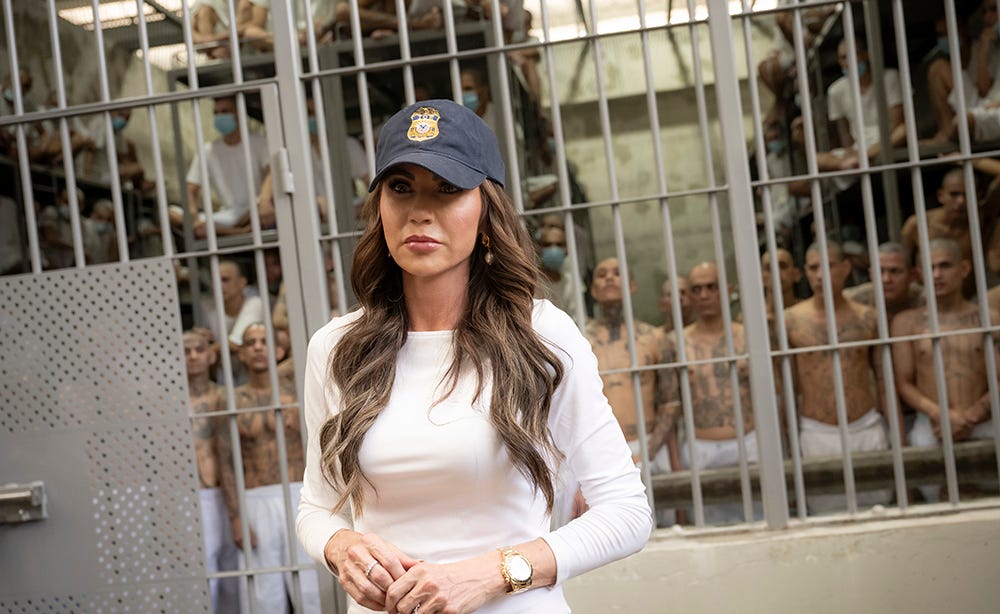These Aren’t the Men We Deported. But They’re the Men They Want You to See.
A staged photo. Real-life injustice. This is what happens when incompetence and cruelty collide.
There’s a photo circulating — I’m sure you've seen it. U.S. Secretary of Homeland Security Kristi Noem standing in front of a sea of tattooed, shackled men, packed shoulder-to-shoulder in a Salvadoran prison. Behind her: rows of brown bodies—shirtless, heads shaved, hunched over, dehumanized.
Noem calls it “strength.” She calls it “leadership.” This is what she thinks will “Make America Great Again.”
But here's the truth: the men behind Noem, caged and inked, are (probably) actual criminals. This is El Salvador's Terrorism Confinement Center (CECOT), after all — a 40,000 capacity prison built to house El Salvador’s most dangerous gang members.
But these men aren't the men we deported.
That image isn't about safety or justice. It's propaganda. It's a photo op designed to burn one message into Americans minds: Latino men are dangerous. Tattoos mean crime. Round them up. Ship them out. Who they actually are doesn't matter.
Because who we actually deported are people like Andry, a 31-year-old gay Venezuelan makeup artist. He legally sought asylum in the U.S. and had no criminal record. But ICE officials claimed his tattoos looked like gang signs. So they put him on a plane—not back to Venezuela, but to El Salvador—and now he sits in a cage built for terrorists.
We deported Neri José Alvarado Borges, a 24-year-old psychology student from Dallas with a tattoo of an autism awareness ribbon, inked in honor of his younger brother. That was enough for ICE agents to apprehend him. He, too, was sent to CECOT.
We deported Jerce Reyes Barrios, a beloved youth soccer coach with a Real Madrid logo and a rosary on his arm—symbols of faith and fútbol. Barrios was in America seeking asylum after being detained and tortured in Venezuela for participating in anti-government protests. A hand sign he made in a photo—actually “I love you” in American Sign Language—was twisted into a gang gesture. Betrayed by a second government, he’s now detained again.
And Francisco Javier García Casique, a young father and barber with no tattoos at all, was deported, too. The evidence against him? There is none.
Even a U.S. Immigration and Customs Enforcement officer thinks this is reprehensible. In a signed, sworn affidavit, that official confirmed that many of these men had no criminal records or gang affiliations. ICE knew. They knew these men were not threats.They deported them anyway.
So let's be clear: Secretary Noem didn't pose in front of a prison of “our” deportees. She stood before a wall of people whose faces were never meant to matter. She used their bodies to tell a story—that all Latino men are criminals, that cruelty is strength, and that we should bring that cruelty home.
We should all be alarmed.
Because the reality is, when you turn human beings into props, when you use photos instead of facts, and when you criminalize identity instead of behavior—you are no longer leading. You're participating in fascism. You are making fear a policy platform.
And fear has already done enough damage.
We deserve leaders who see the full humanity of people seeking safety here. Leaders who value truth over optics. Who understand that due process is not a loophole—it's the backbone of American justice.
The men Kristi Noem stood in front of are not the men we deported.
But the message she stood behind? That message is the real threat.
Kalah Espinoza is a partner at Spillway, an impact advocacy consultancy working at the intersection of politics, policy, and philanthropy. Drawing on over two decades of leadership in the private sector, Kalah now leads initiatives that strengthen American democracy, champion civil liberties, and drive civic engagement.
As an author and thought leader, she writes on democracy, antisemitism, women’s rights, Latino advocacy, and U.S.-Israel relations—bringing clarity and conviction to complex issues that shape the national discourse. Her work highlights voices too often overlooked.
Kalah is based in San Francisco and maintains an active presence on social media, where she amplifies pro-democracy narratives and mobilizes support for values-driven policymaking.






